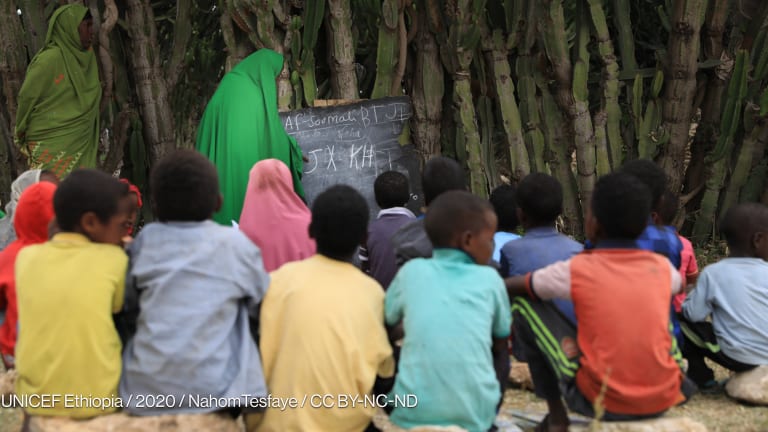
WASHINGTON — More than 10 years after it was first introduced, the Reinforcing Education Accountability in Development Act, or READ Act, finally passed the United States Congress in 2017. The bill mandated a realignment of U.S. government education work — which involves 10 agencies — to help further the goal of universal basic education for all children around the world.
“Each agency has their own indicators right now, so what we’re looking at is where can we harmonize some of these to have shared indicators on education outcomes.”
— Julie Cram, deputy assistant administrator, USAID’s Bureau for Economic Growth, Education, and EnvironmentThe READ Act required that the government release a strategy on international basic education outlining how relevant agencies would comply with the READ Act and improve operations to expand impact. It also required that the U.S. Agency for International Development — the lead agency — name a global education coordinator who would oversee efforts to streamline operations across U.S. agencies and implement the global strategy.
Julie Cram was appointed to be that coordinator and is responsible for overseeing the implementation of the U.S. government strategy. Cram, who also serves as the deputy assistant administrator at USAID’s Bureau for Economic Growth, Education, and Environment, recently sat down with Devex to discuss how the new U.S. government basic education strategy will impact implementers and other partners, and why flexibility to achieve desired outcomes is so important.
This conversation has been edited for clarity and length.
How does the basic education strategy help mobilize financing for education?
Globally there’s a $1.8 trillion education deficit. That’s pretty well known across the education sector. We know that the donor community and the ability of country partners through domestic resource mobilization to fill that $1.8 trillion is a heavy lift. The only avenue left is how we leverage U.S. government dollars as well as working in the entire education and international education architecture to encourage better leveraging, more innovation. And that’s across the whole spectrum. It’s not just financing. It’s encouraging private sector investment and innovation.
It’s encouraging the private sector to fill gaps. There’s huge opportunity. We have a report out on the business of education in Africa that was put out by a company that recognizes that the private sector has a $12-18 billion opportunity in Africa. So, how do we encourage smart leveraging of those dollars that is in line with smart outcomes and toward the people that are the most vulnerable and most marginalized to work with the governments to better leverage their dollars? Also, working with the government and the private sector and others to strategically align those dollars where in some cases the public sector’s not filling that void.
How do you go about uniting all the U.S. government agencies involved in international education while at the same time developing individualized country plans?
Behavior change and encouraging greater collaboration and efficiency amongst the U.S. government. Also outcomes and measurement. But really, how do we present a whole of U.S. government approach to an education sector strategy that we, as a U.S. government, are working with the ministry of education and the ministry of finance and other ministries.
The biggest challenge is encouraging everyone to sit around the table. There’s always room for improvement and make sure that it’s all aligned toward better outcomes, that we’re measuring those outcomes similarly, and that those goals and outcomes are created in terms of a specific country’s context.
How does this shift impact implementers?
Many of our U.S. government partners all work with the same implementers because they have a unique and important expertise. Our implementing partners help with everything from evidence to execution. Part of what we want to be able to do is work with our implementing partners in a more holistic way so that we understand where their expertise is, how can we work with them better, and sharing knowledge more efficiently, and that we’re not duplicating efforts with our implementing partners.
And that we’re building upon the previous evidence and the expertise of our implementing partners, and also bringing new voices in — there are many. Part of what we want to be able to do is make it easier to work with USAID as well as the U.S. government. We now have an avenue to bring in new innovations and also others to work with our implementing partners and create a little bit more of a synergistic relationship.
How will monitoring and evaluation requirements make sure information is being shared U.S.-government wide as well as with country government and implementers to make sure they can pivot to be the most effective?
At the end of the day that is exactly the goal. That is a high hurdle in some cases and not a high hurdle in others. The first thing on there talks about looking at where we have shared indicators.
Each agency is contributing their head of their metrics and evaluation team to a working group to get after this question. Where is it possible? What are our indicators? Where are they shared? And how can we harmonize them so that we’re measuring a couple fundamental outcomes?
Each agency has their own indicators right now, so what we’re looking at is where can we harmonize some of these to have shared indicators on education outcomes, which is called for in the READ Act.








